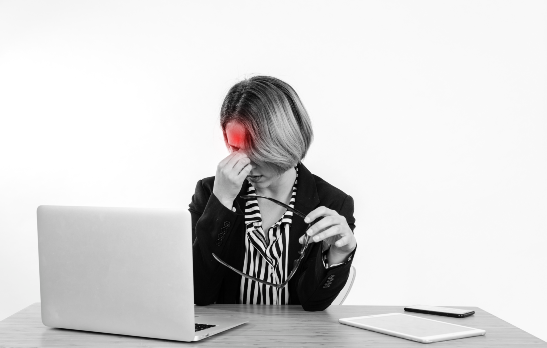Migraine
Migraine headache is a neurological condition that can be extremely unbearable, causing intense pain, sensitivity to light and sound, and even nausea and vomiting. While there are many different triggers that can cause migraines, one of the most common culprits is the lack of sleep. When we don't get enough sleep, our bodies and brains become more vulnerable to a range of health issues, including migraines.
In fact, research has shown that people who suffer from migraines are much more likely to experience them when they haven't gotten enough rest. In this write-up, we will explore the connection between migraines and sleep deprivation, their causes, symptoms, risk factors, and offer some ways for preventing and treating these painful headaches. If you are someone who experiences migraines, and suspect that your lack of sleep may be a contributing factor, then this article is for you.
What is a Migraine?
A migraine is a neurological disorder that causes recurring headaches that are typically moderate to severe in intensity. Migraine headaches are often accompanied by other symptoms, including nausea, vomiting, sensitivity to light and sound, and visual disturbances. The frequency of a migraine attack can be once a year, once a week or 2 to 4 times in a month, depending on how stressful your schedule is.
What are the Causes of Migraine?
It is difficult to fully understand the cause of migraines as of now. However, researchers believe that migraines are caused by changes in the brainstem and its interactions with the trigeminal nerve, a major pain pathway. Migraine headache is caused when specific (trigeminal) nerves send a pain signal to the brain indicating something is hurting, automatically triggering the inflammatory response of the brain.
Sometimes factors like stress, missing a meal, exposure to intense light or sound, sensitivity towards a particular chemical or food ingredient, caffeine, hormonal changes in women can trigger an inflammatory response to the brain and cause a migraine. Other factors that trigger migraine include genetics, certain foods and drinks, and lack of sleep.
What are the Symptoms of Migraine?
Migraines are typically characterized by a throbbing or pulsating headache that is usually on one side of the head. Other common symptoms of migraines include:
- Nausea and vomiting
- Sensitivity to light and sound
- Blurred vision
- Dizziness
- Loss of appetite
- Feeling extreme warm or cold
- Neck stiffness
- Impaired memory
- Tingling or numbness in the face or extremities
Symptoms can last anywhere from a few hours to several days, and they can be draining, making it difficult to carry out normal daily activities.
What are the Risk Factors of Migraine?
There are several risk factors that can increase a person's likelihood of experiencing migraines. These include:
- Family history: Migraines tend to run in families, suggesting a genetic component.
- Sex: Women experience more migraine headaches as compared to men due to the hormonal changes that they are constantly going through.
- Age: Migraines can occur at any age, but they usually first start during adolescence.
- Hormonal changes: Fluctuations in estrogen levels, particularly during menstruation, pregnancy, and menopause, can trigger migraines in some people.
- Environmental factors: Certain triggers, such as changes in weather, bright lights, and loud noises, can trigger migraines in some people.
How to Prevent Migraine?
There are several lifestyle changes and strategies that can help prevent migraines, including:
- Maintain a regular sleep schedule: Consistently getting enough sleep and waking up at the same time each day can help prevent migraines triggered by lack of sleep.
- Avoid trigger foods and drinks: Certain foods and drinks, such as caffeine, alcohol, and aged cheeses, can trigger migraines in some people. Keeping a track of foods that trigger migraines can help identify the foods and drinks to avoid.
- Manage stress: Stress is the most common (and obvious) reason for getting a migraine. Engaging in stress-reducing activities, such as exercise, meditation, or yoga, can help prevent migraines.
- Stay hydrated: When your body runs out of water, it starts showing few symptoms, one of them being dehydration. It can lead to a headache if left unattended, so it's important to drink plenty of water throughout the day.
- Take preventative medication: For some people, taking medication to prevent migraines can be an effective way to manage the condition.
While the exact causes of migraines are not fully understood, these lifestyle changes and strategies can help prevent migraines to some extent. If you are a busy individual with uncertain sleep schedule and often experience migraines due to low quality sleep, then AFD Pharma’s Fastnap is just the product for you.
Fastnap is a natural sleep aid that helps in achieving deep and peaceful sleep.
Fastnap Melatonin Oral spray is a natural sleep supplement that helps in rectifying the sleep cycle. It is very effective for inducing deep sleep, decreasing the sleep latency time, providing a relaxing sensation to the mind, relieving stress and anxiety, and helping in waking up refreshed and energetic.
People suffering from certain sleeping disorders like Insomnia and jet lag can especially benefit from Fastnap as it improves the overall quality of sleep. It is non-addictive and does not have any withdrawal symptoms.
